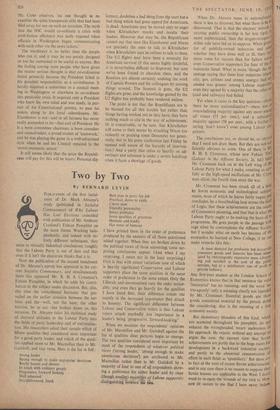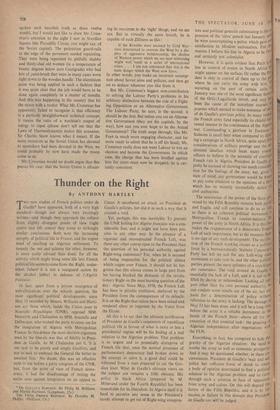Two by Two
By BERNARD LEVIN Now the publication of the second instalment of Dr. Abrams's survey has appeared in the cur- rent Socialist Commentary, and simultaneously there has appeared Mr. R. H. S. Crossman's Fabian Pamphlet, in which he adds his contri- bution to the subject under discussion. But, alas, this time the coincidental harmony that pre- vailed on the earlier occasion between the tor- toise and the—well, not the hare; the other tortoise, let us say—has broken down on this occasion. Dr. Abrams takes his statistical study of electoral attitudes to the Labour Party into the fields of party leadership and of nationalisa- tion. His researchers asked their sample which of fifteen qualities they considered most important for a good party leader, and which of the quali- ties applied more to Mr. Macmillan than to Mr. Gaitskell, and vice versa. Here is the list in full : Strong leader Strong enough to make unpopular decisions Really honest and sincere In touch with ordinary people Progressive, forward looking Well educated Straightforward, frank Best man in party for job Practical, down to earth Clever man Friendly personality Smart politician Sonic qualities of greatness Humane and kindly Has sense of humour I have printed them in the order of preference produced by the answers of all those questioned added together. When they are broken down by the political views of those answering, some sur- prising conclusions appear. (And when I say surprising, I mean not in the least surprising.) First is that with minor variations (one of which is heavily significant) Conservative and Labour supporters place the same qualities in the same order of preference to the same extent. Only the Liberals and uncommitted vary the order notice- ably, and even they go heavily for the qualities I have listed first; their difference comes out mainly in the increased importance they attach to honesty. The significant difference between Labour and Conservative voters is that Labour voters attach markedly less importance to a leader's being 'progressive, forward-looking.'
When we examine the respondents' opinions of Mr. Macmillan and Mr. Gaitskell against the list of qualities clear pictures begin to emerge. The two qualities considered most important by most of the respondents of whatever political views (`strong'leader,' strong enough to make unwelcome decisions') are attributed to Mr. Macmillan rather than to Mr. Gaitskell by a majority of four to one of all respondents show- ing a preference for either leader and by clear (though smaller) majorities of Labour supporters distinguishing between tile two. When Dr. Abrams turns to nationalisatiO there is less to discover, but what there is he discovered. That is that the electors' attitude! existing public ownership is far less rigid, U/ more sophisticated, than the slogan-mongers i either side have led us to suppose. When give° list of publicly-owned industries and ask whether they have done well or ill, there %I more votes for success than for failure Oa! even Conservative supporters for four of the s6 industries listed. What is more, though the Per: centage saying that these four industries (electfr city, gas, airlines and atomic energy) had sae. ceeded was greater among Labour supported' even they agreed by a majority that the other (coal and railways) had failed. Yet when it came to the key question—should there be more nationalisation?—there was si overwhelming majority against any more antaal, all voters (75 per cent.), and a substant^tl majority against (58 per cent., with a further -' saying 'don't know') even among Labour Or porters.
The conclusions are, or should be, so obvi0 that I need not draw them. But they are not suf. ficiently obvious to some. One of these is Mr, R. H. S. Crossman, whose new Fabian Tra`' (Labour in the Affluent Society, 2s. 6d.) takes Mr. Crossman, back on to the Left wing of Ike Labour Party for what I make, counting as care' fully as the high-speed oscillations of Mr. Cross' man allow, the fourth time since the war.
Mr. Crossman has been struck all of a he3P by Soviet economic and technological achieve ments, most of which he leaves fairly vague, and . concludes, by a breathtaking leap across the Ga,)lf , of Logic, thatthese achievements are the result' of Communist planning, and that that is what the Labour Party ought to be making the basis of il5 programme. He goes purple in the passage ‘01/ rage when he contemplates the Affluent Societ), but I wonder what on earth has become of the economics he learned at New College, if he can make remarks like this: A mass demand for profitable but inessential consumer goods and luxuries has been stitnn. lated by extravagantly expensive mass adverbs" ing and satisfied at the cost of the public services, but at a satisfactory rate of profit t° private industry. Any first-year student at the London School of Economics knows that in that sentence the word 'inessential' has no meaning, and the word `e''' travagantly' only a meaning clearly not intended by Mr. Crossman. Essential goods are thoce goods considered essential by the person doing the considering; that is the meaning of a free economic society.
But elementary blunders of this kind, which are scattered throughout his pamphlet, do r1°L, exhaust the wrongheaded, weary uselessness of his approach. He rejects. without any attempt 0 argue the case, the current view that Soviet achievements are partly due to the huge room for development in a backward industrial society', and partly to the abnormal concentration of effort in such fields as `sputnikery.' But these are in fact at the root of recent Soviet achievements• and in any case there is no reason to suppose that Soviet lessons are applicable in the West. I don want to re-open the wounds of my visit to Mos- cow (it occurs to me that I have never before spoken such heartfelt truth as those twelve words), but I would just like to draw Mr. Cross- man's attention to the sight 1 saw in Sverdlov Square (the Piccadilly Circus, you might say, of the Soviet capital). The pedestrian guard-rails at the edge of the pavement needed repainting. They were being repainted by pitifully shabby and thinly-clad old women (in a temperature of twenty degrees below zero Centigrade) who had bits of paint-brush that were in many cases worn right down to the wooden handle. The aluminium paint was being applied in such a fashion that it was quite clear that the job would have to be done again completely in a matter of months. And this was happening in the country that hit the moon with a rocket. What Mr.Crossman has apparently failed to recognise is that efficiency is a perfectly straightforward technical concept; it means the ratio of a machine's output of energy to input (please don't tell me that the Laws of Thermodynamics makes this nonsense; Sir Charles Snow knows what I mean). If the same resources as the Soviet Union has devoted to sputnikery had been devoted in the West, we could probably by now have made the moon come to us.
Mr. Crossman would no doubt argue that this proves his case: that the Soviet Union is allocat- ing its resources to the 'right' things, and we are not. But in virtually the same breath, he is capable of such Zilliness as this: If the Kremlin were manned by Cold War- riors determined to overrun the West by a dis- play of aggressive brinkmanship, the decline of Western power which we are now witnessing might well result in a series of international crises. . . . I am not convinced that this is the main danger which the West now faces.
In other words, you make an incorrect assump- tion about Soviet aims and policies, and then go on to deduce whatever you like from it.
But Mr. Crossman's biggest non-contribution to solving the Labour Party's problems in his arbitrary distinction between the role of a Fight- ing Opposition or an Alternative Government. The Labour Party, he says, is the second; it should be the first. But unless you are an Alterna- tive Government (they are his capitals, by the way), how can you ever hope to be the Actual Government? The truth seeps through; like Mr. Foot (a much more engaging character, and far more ready to admit that he is off his head), Mr. Crossman really does not want Labour to win an election and become the Government. In which case, the charge that has been levelled against him for years must now be dropped; he is cer- tainly consistent.











































 Previous page
Previous page